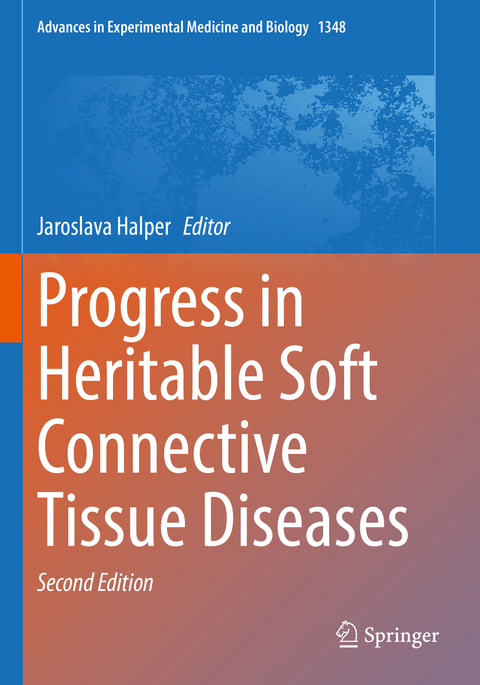
Progress in Heritable Soft Connective Tissue Diseases
Springer International Publishing (Verlag)
978-3-030-80616-3 (ISBN)
This volume represents a substantially revised and updated 2nd edition of a reference handbook on major structural components of soft connective tissues and a whole slew of heritable diseases of soft connective tissues. The number of clearly identifiable and distinct disorders has grown somewhat since the 1st edition in 2014, e.g., Ehlers-Danlos syndrome has now 13 entities. A brand new syndrome, Meester Loeys syndrome carrying the name of Bart Loeys was added as a companion to Loeys-Dietz syndrome. Numerous variations of cutis laxa and joint mobility disorders have been discovered taking advantage of recent advancements in genetic analysis. We have acquired better understanding of pathogenesis and biochemical changes in some other, more established entities, such as Marfan and collagen VI myopathies where better management and possible treatment are on the horizon. Even in the case of connective tissue diseases in domestic animals some progress has been made. All these updates werecontributed by a group of distinguished and preeminent physicians and scientists, all of them not just working in the field but making new discoveries described by them.
Readers will notice that seemingly there is an overlap among many of these disorders. And indeed, many of them, if not most are interconnected because of the prominent roles of TGFbeta, of fibrillin microfibrils and collagen fibril assembly (and other molecules) playing in connective tissues physiology, and by extension in pathogenesis of many disorders described in the book. What I found particularly helpful that author(s) of each chapter bring their own perspective even when described closely related mechanism of the disease. These observations should help with diagnosis and management of such cases.
The first chapters are more general, concentrating more on the physiology, structure and biochemistry of normal soft tissues. That should help in better understanding of the pathophysiology.
Last but notleast, the chapters are very readable, more like detective stories than dry description of genetic/biochemical defects. I do hope that basic scientists and clinicians with similar and diverse interests alike will appreciate this volume and will be inspired by it to develop their research in the field.
Jaroslava Halper, M.D., Ph.D. is a Professor of Pathology at The University of Georgia where she is affiliated with the Department of Pathology, College of Veterinary Medicine, and with the Department of Basic Sciences in the Medical Partnership. She is a Board certified Anatomic Pathologist who received M.D. degree from Faculty of Medicine, University of Toronto. She trained in Pathology at Albert Einstein of Medicine (in the Bronx, New York) and at Mayo Clinic in Rochester, Minnesota. She obtained Ph.D. in Experimental Pathology from the University of Minnesota at Mayo Clinic where she worked on the identification of transforming growth factor e (known better as granulin) with Harold Moses as her major professor. She continued her work on granulins, growth factors and tissue repair when she first arrived at The University of Georgia. With time her research interests have evolved into probing basic problems in tendons. More recently she has conducted ground-breaking research on equine degenerative suspensory ligament desmitis (DSLD). Her group has established that DSLD, a chronic progressive disorder, is a systemic condition characterized by inappropriate accumulation of proteoglycans in connective tissues, in particular in tendons and ligaments.
Basic structure, physiology and biochemistry of connective tissues and extracellular matrix collagens.- Tendon Extracellular Matrix Assembly, Maintenance and Dysregulation Throughout Life.- Basic Components of Connective Tissues and Extracellular Matrix: Fibronectin, Fibrinogen, Laminin, Elastin, Fibrillins, Fibulins, Matrilins, Tenascins and Thrombospondins.- Proteoglycans and Diseases of Soft Tissues.- Growth Factor Roles in Soft Tissue Physiology and Pathophysiology.- Connective Tissue Disorders and Cardiovascular Complications: The Indomitable Role of Transforming Growth Factor-beta Signaling.- The Pathophysiology and Pathogenesis of Marfan Syndrome.- Ehlers-Danlos syndromes, joint hypermobility and hypermobility spectrum disorders.- Ehlers-Danlos Syndrome Associated with Glycosaminoglycan Abnormalities.- Loeys-Dietz Syndrome.- Meester-Loeys syndrome.- Clinical and Molecular Delineation of Cutis Laxa Syndromes: Paradigms for Elastic Fiber Homeostasis.- Collagen VI Muscle Disorders: Mutation Types, Pathogenic Mechanisms and Approaches to Therapy.- Connective Tissue Disorders in Domestic Animals.
| Erscheinungsdatum | 26.11.2022 |
|---|---|
| Reihe/Serie | Advances in Experimental Medicine and Biology |
| Zusatzinfo | IX, 343 p. 1 illus. |
| Verlagsort | Cham |
| Sprache | englisch |
| Maße | 178 x 254 mm |
| Gewicht | 670 g |
| Themenwelt | Studium ► 2. Studienabschnitt (Klinik) ► Humangenetik |
| Naturwissenschaften ► Biologie ► Zellbiologie | |
| Schlagworte | aorta and cardiac valves • Ehlers-Danlos syndrome • Marfan syndrome • tendons and ligaments • Transforming Growth Factor beta |
| ISBN-10 | 3-030-80616-2 / 3030806162 |
| ISBN-13 | 978-3-030-80616-3 / 9783030806163 |
| Zustand | Neuware |
| Informationen gemäß Produktsicherheitsverordnung (GPSR) | |
| Haben Sie eine Frage zum Produkt? |
aus dem Bereich


